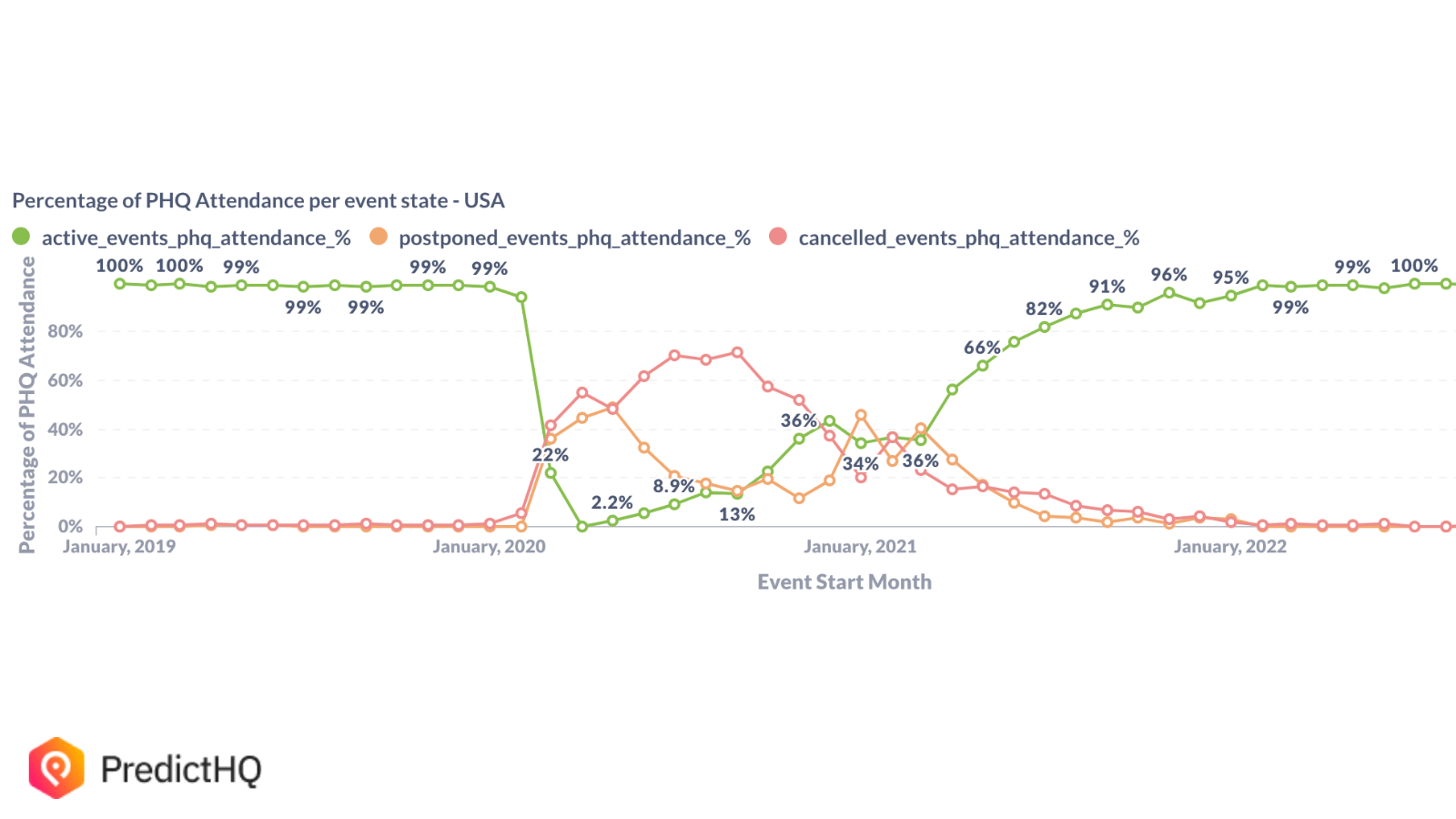Omicron’s impact on large events in the US 2022: Major events holding steady at 95.7% active, with the only notable drops in Chicago and Philadelphia


As the Omicron variant spreads across the US, communities, cities and businesses are working out how to respond. There is a lot of discussion, as well as many helpful data sets being shared. We want to share the latest verified data on how events are impacted to enable people to make the most accurate decisions. So far, when it comes to the more than 33,000 events scheduled in January 2022, the trend is clear: the show must go on.
We know this because at PredictHQ, we tracks events worldwide across 19 categories including sports, conferences, concerts and festivals, as well as academic dates, school dates by district and live breaking events such as severe weather warnings.
As there has been so much discussion about some of the major event postponements, we want to share some of the most up-to-date information on how events are impacted by the Omicron variant, focusing on attended events: sports, concerts, conferences, expos, performing arts, community and festival.
More than 95% of the 33,000 events in January are going ahead
As of January 5, the vast majority of major events in the US in January were going ahead, with 95.7% of events in PredictHQ’s systems categorized as active and less than 500 that have been canceled or postponed:
2.3% have been canceled
2% have been postponed
While this is higher than pre-pandemic year’s January cancelation and postponement rates, it means the impact of this variant is milder, as a majority of the nation is vaccinated, the US declares the show must go on, which in January includes:
13,115 concerts
1,685 expos
565 festivals
And 6,858 sports games
All of these events can impact demand for businesses near or around the event venues. If these aren’t in your forecasts or plans, it can lead to significant demand anomalies that your team and inventory aren’t prepared for. Get in touch with our team so we can ensure you have access to the demand intelligence your recovery strategies need.
Notable event cancellations/postponements in January 2022
While there aren’t many cancellations and postponements, it’s critical that companies know which significant events have been canceled or postponed if they had already prepared their staffing, pricing or inventory strategies to make the most of this demand surge. Below we have listed the most notable.
With more than 32,500+ events going ahead in January in the USA alone, you can bet there is a wide range of events in our systems. We rank every event by predicted impact, as well as use a series of machine learning models to accurately predict the attendance at these events, known as PHQ Attendance.
The 10 largest events that were originally scheduled to take place in January that have changed:
The Philadelphia Auto Show expo of 257,500 expected attendees has been postponed.
The Sundance Film Festival in Salt Lake City with 125,000 expected attendees has gone online.
The Washington Sportsmen Show in Puyallup, Washington with 125,000 expected attendees has been postponed.
The NAMM Show expo in Anaheim with 115,800 expected attendees has been postponed.
The Fit Expo in Los Angeles with 60,000 expected attendees has been postponed.
The Phoenix Fan Fusion expo with 57,800 expected attendees has been postponed.
The Progressive Insurance Chicago Boat, RB & Sail Show with 50,000 expected attendees has been postponed.
The New England International Auto Show with 40,000 expected attendees has been postponed.
The New York Times Travel Show with 35,500 expected attendees has been postponed
The Atlanta Boat Show 2022 with 28,800 expected attendees has been postponed.
Event cancellations are minimal, but more pronounced in some cities such as Chicago and Philadelphia
There are many events each month and they vary from 30 people concerts through to 257,500 people expos. The most effective way to describe the impact of events at a macro level is to analyze changes to the total predicted attendance at events, rather than the volume of individual events.
This is the metric we have used above for the 95.7% statistic. But obviously the amount, size and attendance at each event varies significantly by state and city. To bring this to life, here are some of the most important cities for our customer base:
Atlanta: 96.0% of events scheduled for January 2022 are going ahead
Austin: 99.8%
Cleveland: 95.8%
Chicago: 84%
Kansas City: 96.7%
Portland: 93.9%
Washington DC: 96.2%
Dallas: 98.2%
Las Vegas: 95.2%
San Francisco: 96.8%
Denver: 98.4%
Nashville: 97.1%
Seattle: 95.4%
Houston: 98.7%
Philadelphia: 77.9%
NYC: 95.8%
Need to know about event cancellations, postponements as well as new events and impactful event clusters in these cities or others? Get in touch with our team.
Events are continuing to recover from the great April 2020 wipe out
Throughout 2021, the year of the great event recovery across the United States, we published many reports about the rate of events returning both on our site and working with the media. The most recent snapshot we shared with Recode on some of the most impactful categories.
Predicted US event attendance in the second half of 2021 compared with the second half of 2019:
Festivals: 107%
Sports: 82%
Expos: 68%
Concerts 52%
Conferences 37%
Conferences continue to be the most impacted category, as it is the easiest category to migrate to partly, mostly or purely virtual.
With more Americans vaccinated than ever, most events and cities are holding the course as we return to the new normal. While there has been a minor lift in postponements and cancelations in January 2021, other 2022 months are all above 98% so far.
If events are impactful for your business, or a topic you wish to cover in more detail, get in touch with your team to ensure you have access to enriched, verified data that is updated every minute to reflect the occasional event being postponed or canceled, and the many new events being scheduled.



